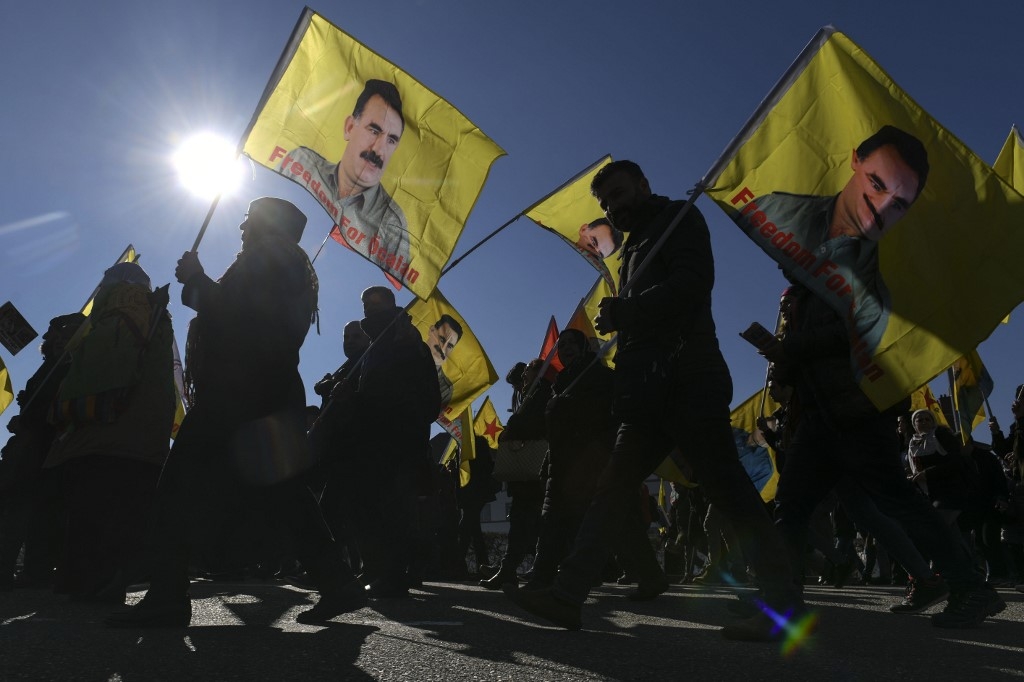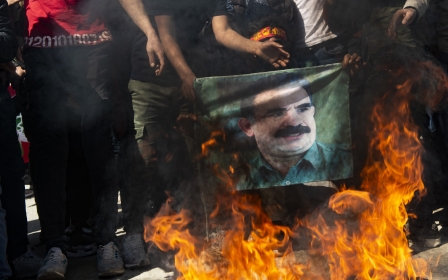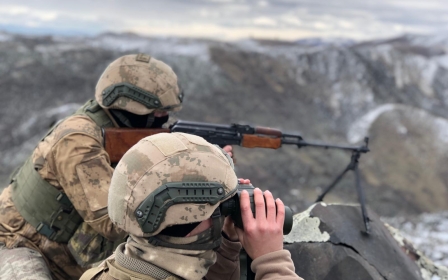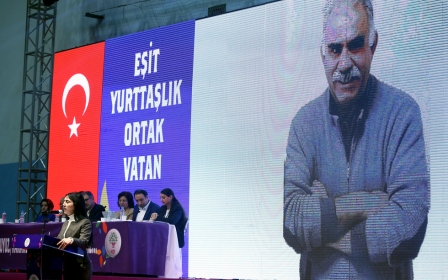PKK leader Ocalan says Syria's Kurds should respect Turkey's concerns

Abdullah Ocalan, the imprisoned leader of the Kurdistan Workers’ Party (PKK), said on Monday that any peace deal in Syria involving the Syrian Democratic Forces should be sensitive to Turkey's concerns, and called for a resolution to the country's conflict based on "democratic negotiations" rather than violence.
Ocalan's comments came in a statement released by his lawyers on Monday after they had been permitted to see the PKK leader for the first time since 2011 on 2 May for one hour. Ocalan was captured in Kenya in 1999.
The statement, signed by Ocalan and three other PKK inmates being held in prison on Imrali island in the Sea of Marmara, was earlier delivered to his lawyers by Turkish authorities.
'We are ready to have talks for dialogue, negotiation and peaceful ways to resolve the problem'
-Ferhat Abdi Sahin, SDF
general commander
Last week's meeting came after growing public pressure by Ocalan supporters. Several imprisoned PKK members and a member of parliament for the pro-Kurdish People’s Democratic Party (HDP) were on a hunger strike for more than 150 days in protest at Ocalan’s “isolation”.
Seven convicted PKK members also committed suicide in prison, according to HDP officials.
New MEE newsletter: Jerusalem Dispatch
Sign up to get the latest insights and analysis on Israel-Palestine, alongside Turkey Unpacked and other MEE newsletters
“We believe, with regard to the Syrian Democratic Forces, the problems in Syria should be resolved within the framework of unity of Syria, based on constitutional guarantees and local democratic perspective. In this regard, it should be sensitive to Turkey’s concerns,” the statement read.
The SDF is the US-backed force of Kurdish and Arab fighters that has played a leading role in the ground war against the Islamic State (IS) group in Syria, claiming control of large areas of the northeast of the country in the process.
The main fighting force within the SDF is the Kurdish People's Protection Units, or YPG, which the Turkish government considers an extension of the PKK, which is considered a terrorist organisation by Turkey, the European Union, and the United States.
Ocalan's statement also called for an end to the use of methods in prison that threaten the lives of PKK members protesting against isolation.
Conflicting remarks
The release of the statement follows conflicting remarks made by SDF officials on their alleged contact with the Turkish government.
The general commander of the SDF, Ferhat Abdi Sahin, known as Mazlum Cilo, told local media over the weekend that the SDF was having indirect talks with Ankara.
“We are ready to have talks for dialogue, negotiation and peaceful ways to resolve the problem,” said Sahin, a former PKK fighter who was reportedly close to Ocalan when he was based in Syria prior to 1999.
But Salih Muslim, a former Syrian Kurdish leader who still has power within the SDF, denied that there were direct or indirect talks.
“US Syria Special Representative James Jeffrey is mediating. He is talking to Turkey then talking to us. That’s all,” he said.
Last month, a senior US defence official, Charles E. Summers Jr, told reporters that discussions between Turkey and the SDF were ongoing.
"Well, all I can tell you is that our Turkish allies and our SDF partners, you know - we know that they have legitimate issues that they're discussing,” he said.
A Pentagon spokesperson later “clarified” Summers’ statement and said discussions were happening between the US and Turkey, not with the SDF. A senior Turkish official also told Turkish media last month that Turkey wasn’t talking to the SDF.
Ocalan's statement also made a reference to the 2013 declaration in which he called for a comprehensive roadmap based on "democratic negotiations" to end the 30-year-old conflict between the Turkish state and the PKK.
The ceasefire and the peace process between the Turkish government and the PKK collapsed in 2015, with the PKK and affiliated groups resuming attacks on Turkish security forces and carrying out a series of bombings, and Turkish security forces laying siege to PKK-held areas in the Kurdish-majority southeast.
"For us, a dignified peace and democratic political solution is fundamental," the statement said.
Middle East Eye delivers independent and unrivalled coverage and analysis of the Middle East, North Africa and beyond. To learn more about republishing this content and the associated fees, please fill out this form. More about MEE can be found here.




